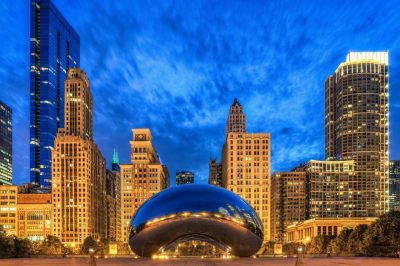 The piece of legislation aimed at bringing a new life to a Chicago casino venue by making some changes in the tax structure applicable to the proposed facility has emerged.
The piece of legislation aimed at bringing a new life to a Chicago casino venue by making some changes in the tax structure applicable to the proposed facility has emerged.
The proposal has been made after Chicago Mayor Lori Lightfoot visited the Capitol. The piece of legislation is enthusiastically supported by the mayor and has apparently been backed by Governor J.B. Pritzker and Senate President John Cullerton. Pritzker’s office has confirmed support for Mayor Lightfoot’s proposal.
The aforementioned support, however, may not guarantee success to the measure, because the controversial piece of legislation could face some problems at the House. Neither the House or the Senate took action on the Mayor’s plan on Wednesday, leaving only Thursday to try to run the proposal through both chambers, which if not impossible, would be extremely difficult.
At a press conference that took place at a City Hall, the mayor explained that the establishment of a casino in Chicago is expected to raise about $215 million on an annual basis that could be used for various community projects. Earlier in 2019, an Illinois Gaming Board’s consultant shared that the proposed taxes amounting to up to 72% of gross gambling receipts were so high that it could be extremely hard to finance the construction of a gambling facility and even to attract an operator.
Another Effort on the Bill Could Be Made in 2020 if the Present Measure Fails
 Under the provisions of Mayor Lightfoot’s bill, the company that operates both the Chicago venue and the other new casinos would be provided with the chance to delay the massive up-front taxes, also popular under the term “reconciliation payment”, for up to 6 years. In the currently existing law, this period is only two years.
Under the provisions of Mayor Lightfoot’s bill, the company that operates both the Chicago venue and the other new casinos would be provided with the chance to delay the massive up-front taxes, also popular under the term “reconciliation payment”, for up to 6 years. In the currently existing law, this period is only two years.
The other change that is to be brought by the measure seeks to slightly boost taxes imposed on table and video games. However, further details on this change were not provided right away.
Under the existing proposal, both the state of Illinois and the city of Chicago would see smaller tax revenue at graduated rates, but the revenue portion set to be received by the state is more significant. Some of the startup costs for a potential developer of a gambling venue in Chicago would also be removed.
The Senate was set to initiate a hearing on the new language of Mayor Lightfoot’s measure. Such a hearing, however, will be held in the House that is the first chamber to act under the law. Some comments made by President Cullerton were interpreted by some analysts as a suggestion that such action is not likely to happen in the House, but Lightfoot said the supporters of the bill need to remain optimistic, as the situation is volatile.
In any case, if the amended Senate Bill 669 fails to make further progress, local lawmakers could make another effort in 2020. The city of Chicago has not made plans to count on the estimated additional casino revenues until at least 2021.